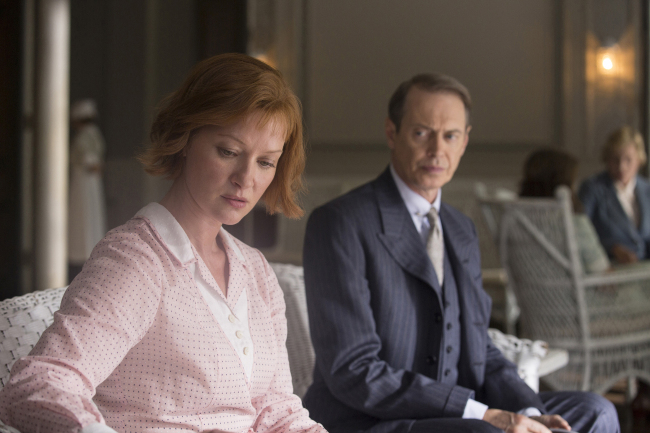It’s almost time to wave goodbye to the sons of anarchy. I’m not referring to the FX series about motorcycle hooligans who rode in from some demented Shakespeare festival, although that show also will be missed when it wraps up in December.
But the more compelling anarchists are at the heart of HBO’s “Boardwalk Empire,” a drama that belongs on the shortlist of TV’s all-time greatest, right alongside “The Wire” and “Breaking Bad.” Sunday’s episode puts the finishing touches on a show that took the gangster stereotypes embedded in our minds from nearly a century of movies, then twisted them just enough to create something truly original.
The first wrinkle was casting Steve Buscemi, a terrific character actor who looks more like the guy behind the counter of a convenience store than the most intimidating mobster in Atlantic City. As it turns out, his role of Nucky Thompson is loosely based on real-life crime kingpin Enoch L. Johnson, who actually looked a lot like James Gandolfini.
 |
Gretchen Mol and Steve Buscemi in “Boardwalk Empire.” (MCT) |
But by betting on Buscemi, series creator Terence Winter ― a key player on the creative team behind “The Sopranos” ― and executive producer Martin Scorsese sent out a strong message: This was going to be an antihero who needed to rely more on brains than on brawn. It also doesn’t hurt that the actor has TV’s saddest eyes, which he puts to good use in this final season as Thompson reflects on his less-than-ideal childhood and laments a near future without Prohibition ― and without the need of a bootlegger like him.
As he prepares for his downfall, Thompson seems to be punishing himself for not leaving a more respectful legacy. In last week’s game-changing episode, he plops himself in a dive bar, propositions a couple of floozies and clumsily tries to recite a poem from grade school. It’s almost as if he’s asking to be hoodwinked ― which is exactly what happens.
A great protagonist needs great enemies, and Thompson had a rogues’ gallery that would give Batman the chills. Among the most memorable: the Commodore (Dabney Coleman), a pedophile who ran the city before Thompson took over; Gyp Rosetti (Bobby Cannavale), a cross-dressing lunatic with a quick temper; Valentin Narcisse (Jeffrey Wright), a shrewd businessman capable of outwitting Thompson, and, of course, Al Capone, played with just the right amount of gusto by Stephen Graham. He sniffed around the outskirts for the first four years, but in this final season, he’s a full-blown, frightening tour de force.
While the cast is impressive, the real stars of the show are its roster of directors, starting with Scorsese, who set the tone in the first episode, creating a cinematically lavish tone in which you could almost smell the cigarette smoke and whiskey.
But the drama’s most valuable player is “Sopranos” veteran Tim Van Patten, whom film historian David Thomson has pegged as the most effective director of his time. Van Patten’s staging of rain-drenched murder in the Season 2 finale still haunts for its beauty and coldblooded simplicity. No surprise he’s at the helm for next Sunday’s finale.
“Empire” has never been a major hit. Only 1.5 million viewers watched the initial airing of last week’s episode on a night when “The Walking Dead” drew 17 million fans. And for the past two years, the series has not been included among the shows nominated for best drama at the Emmys. Perhaps the competition has been too rich. Perhaps the plot is too complicated. Or maybe the idea of Buscemi as a gangster chief was just too radical for people to accept.
My only hope is that people will discover the series in repeats or on DVD, much as folks did with “The Wire.”
Until then, we few faithful followers will savor the finale with relish and a tumbler of whiskey.
By Neal Justin
(Star Tribune (Minneapolis))
(MCT Information Services)
